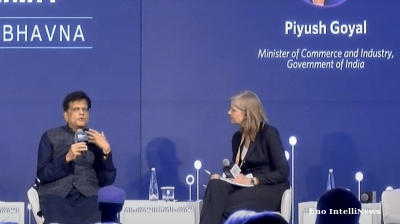The EU’s fifth round of sanctions against Russia targets transport bringing Russian goods to European markets. The European Commission said that the new sanctions were adopted in retaliation for atrocities committed by Russian armed forces in Ukraine.
The bulk of the new sanctions package is aimed at reducing the flow of Russian and Belarusian imports into Europe. EU ports are prohibited from receiving Russian-registered vessels, while Russian and Belarusian trucks aren’t allowed to transport goods by road in the EU, including in transit.
These measures come with some caveats, though. Energy imports, agricultural produce, medical and humanitarian aid are all still allowed into Europe.
The EU has also added jet fuel, quantum computers and high-tech components to a list of banned products for exports. Wood, cement, fertilisers and alcohol were added to a list of banned imports.
“Russia’s war of aggression against Ukraine grossly violates international law and is causing massive loss of life and injury to civilians,” said the EU’s representative for foreign affairs, Josep Borrell. “Russia is directing attacks against the civilian population and is targeting civilian objects, including hospitals, medical facilities, schools and shelters. These war crimes must stop immediately. Those responsible, and their accomplices, will be held to account in accordance with international law,” he added.
Perhaps the hardest-hitting measure in the EU’s new package of sanctions is a ban on Russian coal. Russian coal imports to the EU are currently worth around $8.5bn per year. Russia is the biggest exporter of solid fuel to the EU, accounting for almost half of total imports.
However, critics of the sanctions within the EU are saying they don’t go far enough. Germany has led opposition within the EU to banning Russian gas imports. The EU is heavily dependent on Russia for its gas – 41.1% of EU gas imports came from Russia in 2021, totalling $145bn according to estimates by the Institute of International Finance.
Last week, the European Parliament called for a full embargo on imports of Russian energy, including gas. The motion was passed with an overwhelming majority – with 513 votes in favour, and just 22 against. However, the vote is not binding, and only serves to increase pressure on member states.
Romanian MEP Siegfried Muresan says that the EU is paying Russia about €800m each day for the supply of fossil fuels, adding that a total embargo was necessary to stop financing the war in Ukraine.
With the caveat of Russian gas, however, the current sanctions regime is effectively approaching a full sanction of Russian goods. By not allowing lorries into the EU from Russia and Belarus, Europe is cutting off the vast majority of Russian trade by volume.
Sources say that Russian and Belarussian freight is already being turned around at the borders with the Baltic republics and Poland.
Meanwhile, the prohibition of Russian ships in EU ports is reportedly already being enforced in Ireland.
The import ban on seafood, spirits, wood, cement and fertilisers represents €5.5bn of trade each year. The export ban on jet fuel and high-tech components is valued at around €10bn per year.
A full transaction ban – including an asset freeze and isolation from the EU financial markets – is being imposed on four key Russian banks, which the EU says comprise 23% of the Russian banking sector.
The EU also vowed to close loopholes in existing sanctions packages, including extending a prohibition on deposits to crypto-wallets from Russian accounts and banning the sale of banknotes and transferrable securities to Russia and Belarus or citizens of either country.
With Ukraine’s Azov Battalion claiming that the Russian army used chemical weapons against Ukrainian soldiers on Tuesday, 12 April, it is likely that more sanctions are around the corner. The difficulty for the EU here will be finding sectors to target which will have a material impact on Russia’s economy and war chest without having to rehash the debate over Russian gas. As Germany, Hungary, and other defenders of gas imports come under mounting pressure to change their tune, the EU is running out of other industries it can productively sanction before it needs to address the elephant in the room.
Features

Minerals for security: can the US break China’s grip on the DRC?
The Democratic Republic of the Congo is offering the United States significant mining rights in exchange for military support.

Southeast Asia welcomes water festivals, but Myanmar’s celebrations damped by earthquake aftermath
Countries across Southeast Asia kicked off annual water festival celebrations on April 13, but in Myanmar, the holiday spirit was muted as the country continues to recover from a powerful earthquake that struck late last month

India eyes deeper trade ties with trusted economies
India is poised to significantly reshape the global trade landscape by expanding partnerships with trusted allies such as the US, Indian Commerce and Industry Minister Piyush Goyal said at the Carnegie India Global Technology Summit in New Delhi

PANNIER: Turkmenistan follows the rise and rise of Arkadag’s eldest daughter Oguljahan Atayeva
Rate of ascent appears to make her odds-on for speaker of parliament role.



_Cropped.jpg)
